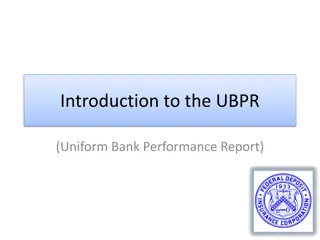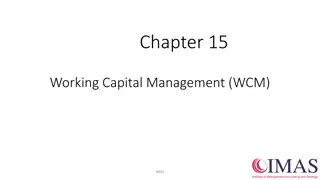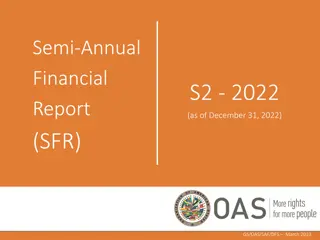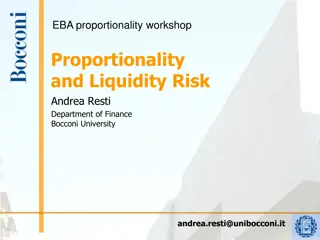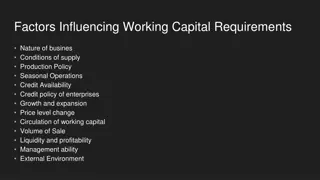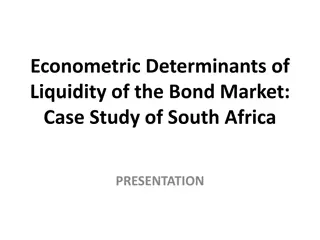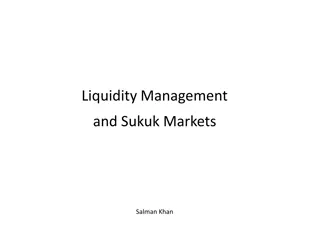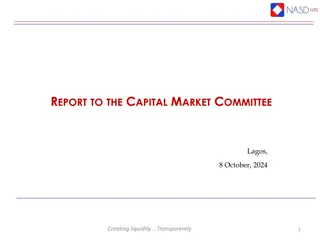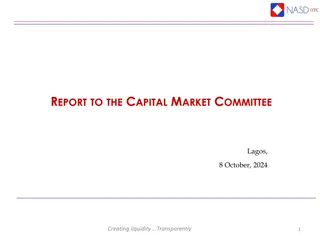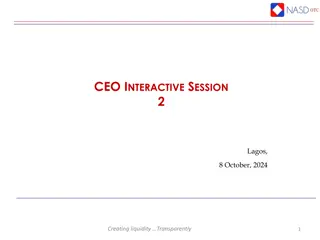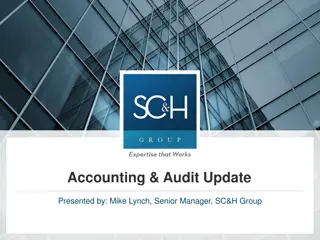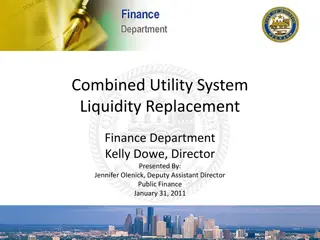OmniSource - Revolutionizing Cross-Chain Trading
OmniSource is a decentralized exchange integrating 20 blockchains, addressing liquidity, slippage, and security issues in crypto trading. With a focus on cross-chain capabilities, it offers a secure and efficient trading solution across multiple ecosystems.
2 views • 19 slides
Comprehensive Course on Indian Banking System and Asset/Liability Management
This course covers various aspects of the Indian banking system, including functions of commercial banks, bank regulatory environment, product and services provided by commercial banks, bank performance evaluation, asset/liability management, and techniques for managing risks. Participants will gain
3 views • 39 slides
Understanding Financial Markets in India
Financial markets play a crucial role in connecting lenders and borrowers, providing avenues for investment and capital generation. In India, the financial system includes money markets and capital markets, offering diverse financial products and opportunities for investors. Money markets deal with
2 views • 106 slides
Revolutionizing Financial Systems with Aquo Protocol
Aquo aims to integrate global financial systems into a unified protocol, addressing issues like limited liquidity, high costs, and restricted access to diverse assets. By tokenizing Real World Assets and offering innovative solutions, Aquo empowers investors with enhanced liquidity, global access, a
2 views • 10 slides
Financial Analysis of Petrisin Company for Fiscal Year Ended December 31, 2014
The financial analysis of Petrisin Company for the fiscal year ending December 31, 2014, reveals key financial information including sales, costs, gross margin, operating expenses, income from operations, net income, and more. The analysis highlights the company's performance in terms of profitabili
2 views • 12 slides
Effective Working Capital Management in Business
Working capital management is crucial for businesses to optimize cash flow and ensure operational efficiency. It involves balancing current assets and liabilities, with a focus on accounts payable, accounts receivable, inventory, and cash. Proper management of working capital is essential for busine
1 views • 9 slides
Understanding Quantitative Credit Control Methods in RBI's Monetary Policy
RBI's monetary policy revolves around maintaining credit quantity in the market through quantitative credit control methods. This includes Bank Rate Policy, Open Market Operations, Cash Reserve Ratio (CRR), and Statutory Liquidity Ratio (SLR). These tools help regulate credit flow, liquidity, and ma
4 views • 8 slides
Analysis of Contemporary Macroeconomic Issues in Papua New Guinea
Professor Stephen Howes, Director of Development Policy at Australian National University, presents his personal views on macroeconomic issues in Papua New Guinea. The focus is on the exchange rate regime and its management, excess liquidity, and fiscal policy. Various economic indicators point to c
1 views • 48 slides
Challenges and Impact of NES HNO 2024 Validation Workshop
Bracing for an impending USD liquidity crisis, a triple water crisis, and galloping inflation in Syria's NES region. Rising food insecurity, fractured governance, unpredictable weather, and funding cuts add to the challenges. The situation calls for urgent measures to address the escalating humanita
5 views • 17 slides
Introduction to Algo Trading in the Financial Domain
Algo trading, also known as automated trading, utilizes computers programmed with predefined instructions to execute trades rapidly and systematically. This process eliminates emotional human impacts and enhances market liquidity. Traders benefit from profit opportunities while minimizing risks and
0 views • 18 slides
Real World Asset Tokenization.
Revolutionize asset ownership with our cutting-edge real-world asset tokenization platform development powered by BlockchainX. Streamline transactions, enhance liquidity, and unlock new investment opportunities through secure and transparent blockchain technology.
8 views • 10 slides
Is the market rally fuelled by PE expansion or Earning Expansion
the current market rally, analyzing whether it's propelled by P\/E or earnings expansion. It explores factors like economic conditions, liquidity influx, and investor strategies, offering insights and suggestions for navigating the evolving financial landscape.
1 views • 4 slides
Real World Asset Tokenization in Blockchain Technology
Tokenization of real-world assets in blockchain technology digitizes physical assets into blockchain tokens, increasing liquidity, transparency, and accessibility by transforming traditional markets through fractional ownership and automated smart contracts.
0 views • 9 slides
Overview of Tanzania Mortgage Refinance Company Limited (TMRC)
TMRC is a private financial institution in Tanzania that supports banks in mortgage lending by refinancing their portfolios. It operates as a mortgage liquidity facility for long-term mortgage lending activities by Primary Mortgage Lenders. TMRC's model is based on successful liquidity facilities an
0 views • 22 slides
Understanding Cash Management: Strategies and Techniques
Cash management involves determining the optimal amount of cash to be held at all times, balancing liquidity and profitability. This process includes motives for holding cash, techniques for controlling inflows, managing float, cash budgeting, and models for optimizing cash balance. Effective cash m
1 views • 41 slides
Understanding the Banking Sector Fundamentals
Banks play a vital role in the economy by accepting deposits and providing loans, aiding in capital formation and accumulation. The word "bank" originates from the French term for a bench. The Banking Regulation Act of 1949 defines banking activities. Banks deal with money deposits, credit, and comm
0 views • 20 slides
Understanding Ratio Analysis in Financial Statements
Ratio analysis is a crucial process in interpreting financial statements by deriving accounting ratios from the balance sheet and profit and loss account. It involves assessing short-term liquidity, long-term solvency, activity ratios, and profitability ratios. Liquidity ratios like current ratio, q
2 views • 41 slides
Overview of Working Capital Management in Financial Management
Working capital management involves strategic decision-making regarding a company's current assets and liabilities to optimize liquidity, profitability, and risk. This process includes understanding working capital concepts, financing current assets, managing liability structure, and maintaining the
1 views • 26 slides
Understanding the Uniform Bank Performance Report (UBPR)
The Uniform Bank Performance Report (UBPR) is a crucial tool used by regulatory agencies, the public, and bank management to evaluate a bank's performance in areas such as capital, asset quality, earnings, liquidity, and market risk sensitivity. This report provides detailed data on a bank's financi
1 views • 24 slides
Efficient Working Capital Management in Businesses
Working capital management involves strategically balancing current assets and liabilities to ensure solvency and maximize asset returns. The main goals include optimizing liquidity, profitability, and resource utilization. Liquidity management is crucial for meeting short-term obligations, and sour
0 views • 27 slides
Understanding Banking Concepts and Monetary Policies
Explore key banking concepts such as Currency Deposit Ratio, Reserve Deposit Ratio, Statutory Liquidity Ratio, High-Powered Money, and their significance in regulating the money supply and liquidity in an economy. These concepts shed light on the relationship between currency, deposits, reserves, an
0 views • 14 slides
Principles of Fiscal Deficits and Debt Management According to Kalecki
Economist Kalecki advocated for a permanent regime of fiscal deficits to manage public debt, emphasizing the importance of debt management for liquidity in the financial system. His principles involve splitting the government budget into functional and financial parts, each influencing aggregate dem
0 views • 6 slides
Understanding Saving and Investing Money
Exploring Chapter 7 on saving and investing money covers the reasons for saving, differentiating between saving and investing, major savings products, tax implications, and factors to consider when saving. Topics include risk, reward, liquidity, and withdrawal ease. The chapter emphasizes the import
0 views • 25 slides
Semi-Annual Financial Report S2 - 2022 Summary
This report provides key financial data for the second half of 2022, including budgetary execution, fund quotas compliance, member states' balances due, liquidity risk assessment, and more. It outlines the overall program budget execution, quota compliance of member states, and fund liquidity status
0 views • 14 slides
Proportionality Principle in Liquidity Risk Management
The concept of proportionality is essential in evaluating measures related to liquidity risk management in the banking sector. The principle emphasizes the necessity for measures to be appropriate, necessary, and not disproportionally disadvantageous. By applying a 3-stage test, institutions can ens
1 views • 10 slides
Board of External Auditors Presentation Highlights
The presentation by Martin Rubenstein, the Chair of the Board of External Auditors, outlines the responsibilities, membership, and mandate of the board in conducting external audits of the financial accounts of the OAS. Key findings and recommendations regarding accounting practices, liquidity issue
0 views • 6 slides
Understanding and Refining Risk in Investment Planning
Investment planning involves understanding liquidity needs, as exemplified by the LTCM case study in 1998. Refining investment style entails assessing risk as uncertainty and aligning it with individual risk appetite and goal timelines. The analogy of driving helps explain different approaches to ha
0 views • 21 slides
Factors Influencing Working Capital Requirements and Management
Factors such as nature of business, supply conditions, production policy, seasonal operations, credit availability, growth, and external environment influence the working capital needs of a business. Factors like credit availability, seasonal sales fluctuations, and liquidity affect the amount of wo
0 views • 11 slides
Determinants of Liquidity in the South African Bond Market
The presentation explores the determinants of liquidity in the South African bond market, emphasizing its importance for economic stability and growth. It discusses the significance of market liquidity, impacts of illiquidity, and compares the efficiency of the South African bond market with others
0 views • 24 slides
Theories of Interest in Microeconomics II
Explore various theories of interest in economics, including the Classical Theory, Liquidity Preference Theory by Keynes, Productivity Theory, Abstinence Theory, Time-Preference Theory, Fisher's Time Preference Theory, and the Loanable Fund Theory. These theories offer different perspectives on the
0 views • 6 slides
Understanding High Frequency Trading and Mini Flash Crashes
This presentation delves into the world of high frequency trading and mini flash crashes, examining the causes, characteristics, and impacts of these phenomena. Authors Anton Golub, John Keane, and Ser-Huang Poon provide insights and analyses based on extensive research, shedding light on topics suc
0 views • 23 slides
Understanding Liquidity Management and Sukuk Markets
Comprehensive overview of liquidity management (LM), focusing on its importance, obstacles, and current tools like Sukuk. Explore how Sukuk can enhance liquidity management, especially in financial institutions, by matching maturities, maintaining sufficient funds, and dealing with short-term pressu
0 views • 25 slides
Use of Credit Default Swaps (CDS) by Investment Funds
Presentation at the ESMA workshop discussed the potential benefits and costs of using Credit Default Swaps (CDS) by investment funds. It highlighted the various uses of CDS, including risk management, alternative liquidity, and investment strategies. Evidence shows that a small percentage of UCITS f
0 views • 6 slides
Understanding the Call Money Market: Features, Participants, Advantages, and Drawbacks
The call money market is a short-term finance market where loans are provided against a call made by the borrower, often lasting from one day to fourteen days. Major participants include commercial banks, stock brokers, and the Discount and Finance House of India. This market offers high liquidity,
0 views • 5 slides
Enhancing Liquidity in the Capital Market: A Comprehensive Report
This report to the Capital Market Committee covers data and insights on participant growth, market index, activities, traders, institutions, and other market developments as of October 8, 2024. It discusses the progress in creating transparency and liquidity in the market, including upcoming events
0 views • 10 slides
Achieving Liquidity Through Transparent Market Operations in Lagos - Capital Market Committee Report
This report dated 8th October 2024 sheds light on the efforts and progress made in creating liquidity transparently in the market. It covers key aspects such as admitted securities, share capital, dematerialization, trade volume, market leaders, and initiatives for market expansion and enhancement.
0 views • 11 slides
Market Report: Creating Liquidity Transparently in Lagos - October 2024
In the CEO Interactive Session and market reports presented, key metrics like total share capital, volume dematerialized, and operating brokers/firms were analyzed. Trade values, quarterly volumes, and market leaders were also highlighted, providing insights into the market's liquidity. The data sho
0 views • 27 slides
Impact of Political Stability on Equity Trading Costs of Cross-Listed Firms
The research explores the relationship between political stability and equity trading costs of cross-listed firms, highlighting the impact of political institutions, liquidity, and investor protection. It delves into the importance of factors like quality of political institutions, transparency, and
0 views • 24 slides
Financial Statements Project Update on Not-for-Profit Entities
The Financial Statements Project update focuses on improving the presentation of net asset classes and providing better information on liquidity, performance, and cash flows for not-for-profit entities. Decisions made relate to liquidity presentation, operating measures, net assets, cash flows state
0 views • 27 slides
Combined Utility System Liquidity Replacement Finance Summary
Presentation of the Combined Utility System Liquidity Replacement Finance Department's summary for liquidity types, series, banks, and financing programs. Details include CP programs supporting CUS's CIP, VRDBs series, and liquidity agreements with highly rated banks. Recommendations for financing m
0 views • 4 slides


















